Is Kamala Harris a ‘failed border czar’ as Trump says?
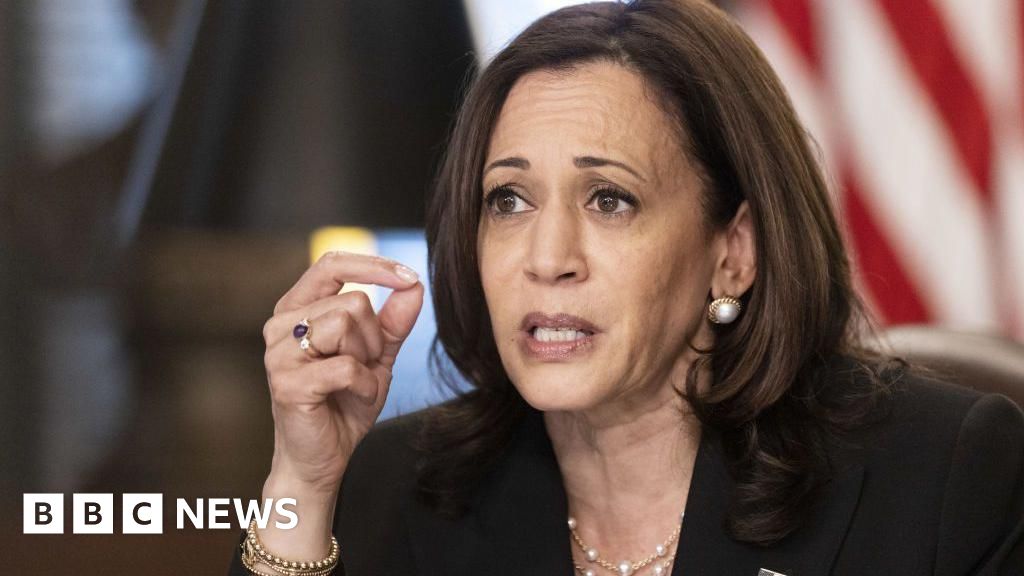
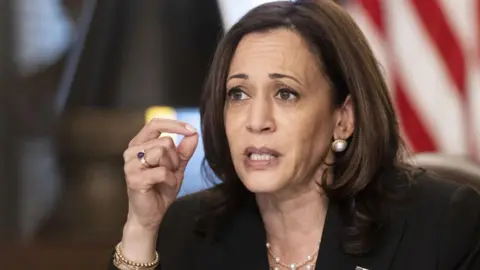 Getty Images
Getty ImagesFrom its opening line, Donald Trump’s first television advertisement blasting rival Kamala Harris took aim at what his campaign believes is her biggest weakness – immigration.
“This is America’s border tsar,” a narrator said, over images of the vice-president dancing, “and she’s failed us.”
A series of statistics followed, illustrating what the Trump campaign says took place under Ms Harris, who was given a role in dealing with the border crisis by President Joe Biden soon after his inauguration.
The figures in the video ranged from 10 million illegal border crossings to 250,000 fentanyl-related overdose deaths.
The voice concluded: “Kamala Harris: failed, weak, dangerously liberal.”
The Harris campaign responded that the former president was running on “his trademark lies”.
It comes as little surprise that the Trump campaign took its first big swing at Ms Harris as the “failed border tsar”, blaming her for the high numbers of undocumented immigrants at the US southern border.
Americans have consistently said in polls this year that immigration is a top problem facing their country, and it will weigh on many of their minds when they cast ballots for the next US president in November.
Since that first ad, Trump and his running mate JD Vance have repeatedly labelled Ms Harris the “failed border tsar”, and tied her to relentless images of people wading across the Rio Grande or squeezing under razor wire into the US.
Her critics say she should have found a way to address the issue over the past four years.
But “border tsar” is a contested term. Allies and former officials who worked with the vice-president say she was not given responsibility for policing the border.
“It was never that position,” said Ricardo Zuniga, the former Deputy Assistant Secretary of State of Western Hemisphere Affairs.
“She knew from the beginning, as did the entire US government, that it was about tackling migration at its source.”
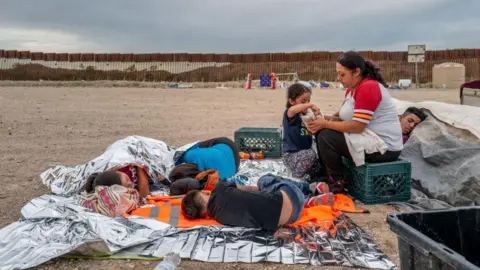 Getty Images
Getty ImagesIn early 2021, President Biden gave Ms Harris the unenviable brief of dealing with the “root causes” of Central American immigration.
At the time, people were fleeing a perfect storm of gang-related violence, economic ruin and environmental disasters in a region called the Northern Triangle – Guatemala, Honduras and El Salvador.
Talking to migrants passing through Mexico, it was clear that most came from Honduras where, they said, a brutal “narco-dictatorship” was in power and wages were as low as five dollars a day.
While the ultimate aim of the Harris role was to reduce the numbers of people arriving at the US border, Mr Biden never used the words “border tsar” in announcing her appointment.
“She is the most qualified person to lead our efforts with Mexico and the Northern Triangle in stemming the movement of so many folks to our southern border,” Mr Biden said at the time.
Still, many people came to see the assignment as all-encompassing. Several media organisations, including the BBC, described Ms Harris as a “tsar” in news reports.
Some commentators in Central America and Mexico questioned her qualifications, given Ms Harris had no prior experience in Latin American affairs.
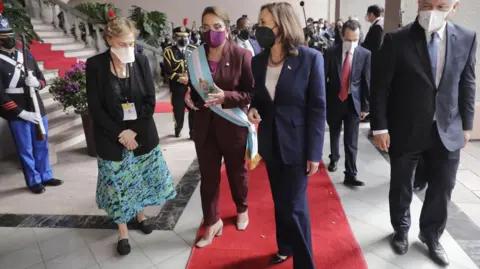 Getty Images
Getty ImagesTsar or otherwise, the job was a daunting, thankless task.
Successfully dealing with decades of underinvestment and the region’s deep-seated economic and political strife would require huge amounts of money, along with goodwill and cross-party cooperation. That’s in woefully short supply in Washington, especially when it comes to immigration.
“The idea that any one US administration is going to alter 500 years of history in Central America in a four-year period is ludicrous,” says Ricardo Zúniga.
As the former lead US diplomat on the Northern Triangle, he maintains the Biden administration did make in-roads to Central America’s problems.
He points to Ms Harris’s help raising $5bn (£3.9bn) from the private sector for job creation and entrepreneurship in the region. Several former members of her team recount how she personally called CEOs, persuading them to put in funds.
During her visit to Guatemala and Mexico in June 2021, I saw Ms Harris try to show a kinder face, following four years of Donald Trump’s harsh rhetoric. She said she appreciated that people were fleeing “hunger, hurricanes and pandemic” and went on to set up a Central American corruption task force.
That trip, though, is most remembered for her stark message to all prospective migrants: “Do not come. If you come to our border, you will be turned back.”
Millions ignored her warning. Roughly two years later, in December 2023, Customs and Border Protection (CBP) officers had 300,000 encounters with undocumented immigrants at the US southern border.
Many who have governed along the border in recent years take a dim view of Kamala Harris and her work in Central America.
“Whatever she was doing diplomatically in other countries, I wouldn’t call it very effective based on what we saw here at the actual border,” says Douglas Nicholls, the Republican Mayor of Yuma, Arizona.
“We had record numbers of people, numbers that far exceeded anything we’d ever seen before, including over three times the population of my city in one year. Those were scary numbers.”
The vice-president is a “legitimate” target on the issue, which he says is not “a made-up excuse to whip up support among the base.”
“It should have been addressed a lot earlier than it was,” says Mayor Nicholls.
Others suggest the funds Ms Harris helped raise had only a small impact on the major incentive driving people north – being paid in US dollars.
Ricardo Barrientos, the director of the Central American Institute of Fiscal Studies, said US private-sector investment paled in comparison to the remittances Central American migrants send home: $37 bn last year alone.
“It’s very small compared to the magnitude of the challenge. Some would say, ‘too little, too late’,” he said.
But Katie Tobin, who worked on immigration at the White House, says Ms Harris’s work has been deliberately “misconstrued and painted in a bad light“.
Ms Harris deserves credit for “a good news story” in Central America, she says. She points to statistics showing a 72% drop in immigration from just Central America between March 2021, when Ms Harris took on the role, and June 2024.
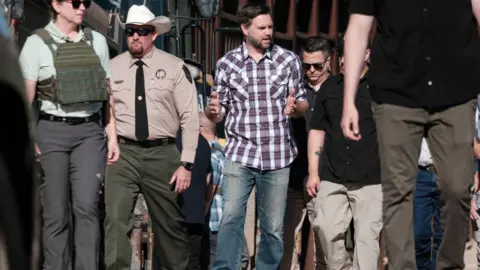 Getty Images
Getty ImagesUltimately, the view of Ms Harris’s record may simply split along party lines.
In recent months, the overall number of undocumented migrants has plummeted.
This is partly due to an executive order issued by President Biden allowing migrants in the US illegally to be deported without processing their asylum requests. There are also more legal pathways into the United States for prospective migrants.
Ms Harris’s defence is primarily to point to Trump’s resistance to getting a bipartisan deal on immigration reform through Congress.
In February, lawmakers reached the deal after intense wrangling, where Democrats ceded much ground to Republican positions. Republican leaders then blocked it at Trump’s behest, reportedly because he did not want to give the Biden administration a win.
“It was Trump himself who, for very openly political reasons, undermined an agreement that would help stabilise the border,” says Mr Zúniga. “So, the Trump campaign is kind of in the way of their own argument on this.”
Mayor Nicholls in Yuma is not moved by that defence, saying: “I think that’s a very short-term memory.”
He recalls contacting the Trump White House at a moment of crisis. He was invited to discuss immigration directly with the president and the Homeland Security secretary in a meeting where he was given more resources.
Three months later, he says “we were out of that crisis”.
“That is effective leadership on the border,” he adds.
Still, Ms Tobin says the Harris campaign should talk about it more.
“When there’s a vacuum and the vice-president doesn’t talk about immigration, it creates an opportunity for Republicans to fill the airwaves with disinformation.”
The Harris campaign responded to Trump’s first advertisement with some of its own.
The first focussed on Trump’s opposition to the immigration deal, and accused him of trying to stop her from fixing the “broken” immigration system.
A more recent one has put the spotlight on her work before the Biden administration, insisting that as California’s attorney general, Ms Harris prosecuted cartels and drug-trafficking gangs – and as president would crack down on fentanyl and human trafficking.
It remains to be seen if this new stance will be enough for her to cast off the “failed border tsar” label, given that Republicans will no doubt continue to hammer home that image all the way to election day.

More on the US election
Related
U.S. economy adds jobs as federal layoffs and rising unemployment…
Julia Coronado: I think it's too early to say that the U.S. is heading to a recession. Certainly, we have seen the U.S. just continue t
The job listing site highlighting H-1B positions so Americans can…
A mysterious new job listings website recently went live, solely showing roles companies want to offer to their H-1B holders seeking Green Cards in an attempt t
Tepid February Jobs Report Boosts Odds of a June Fed…
Federal Reserve Board Chairman Jerome Powell speaks during a news conference. Photo by Chip ... [+] Somodevilla/Getty Images.Getty Images The February jobs repo
French university offers jobs to American scientists afraid of government…
As the current federal government in the U.S. has been freezing or cutting funding for several research grants, a French university has stepped in with an offer














